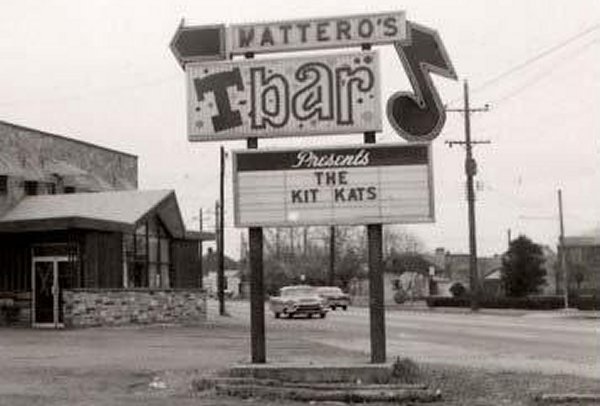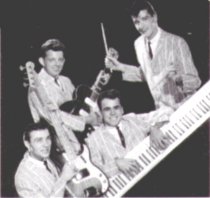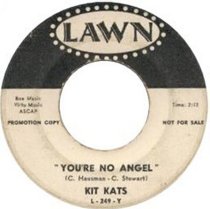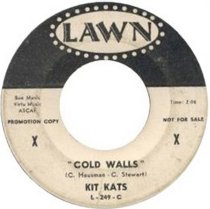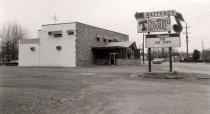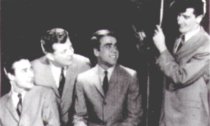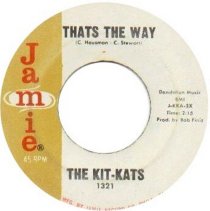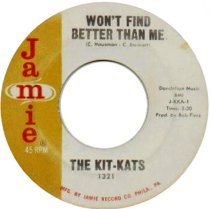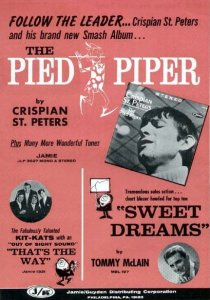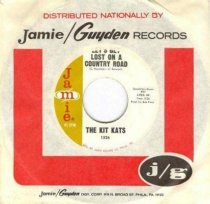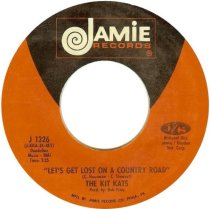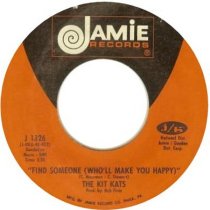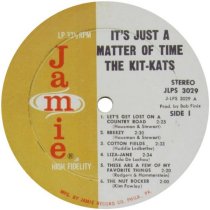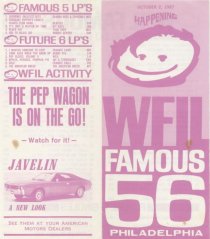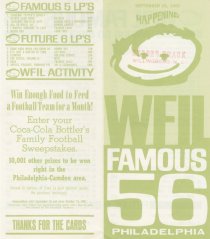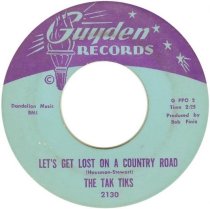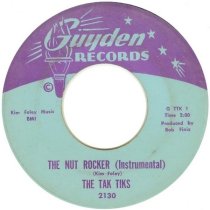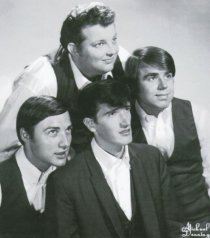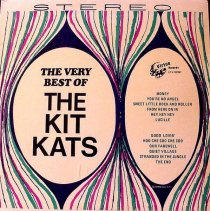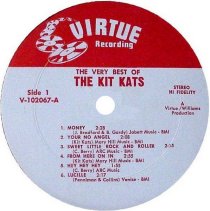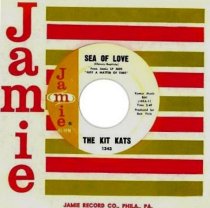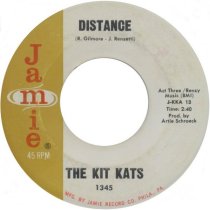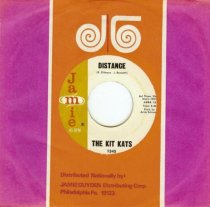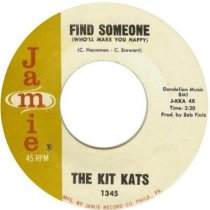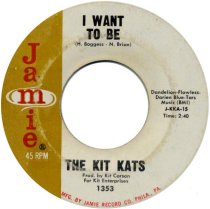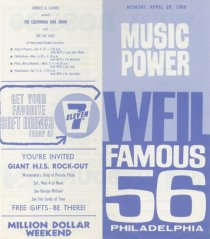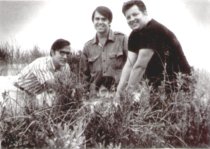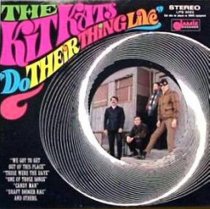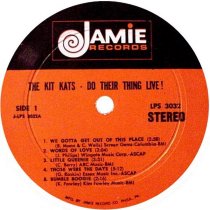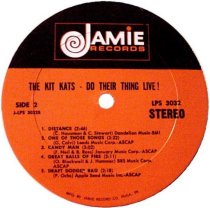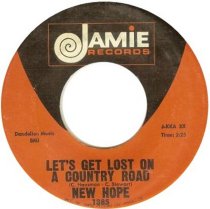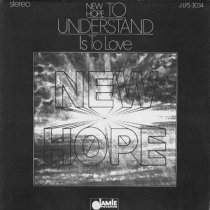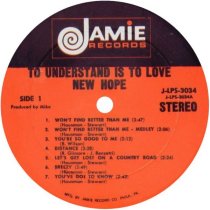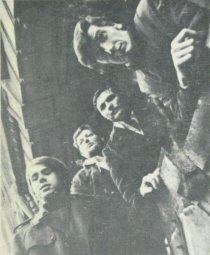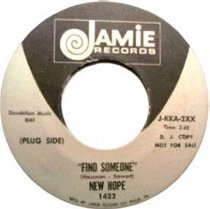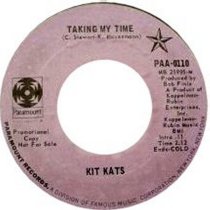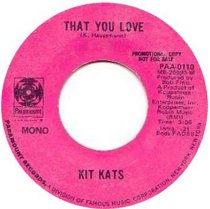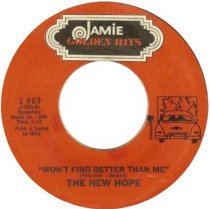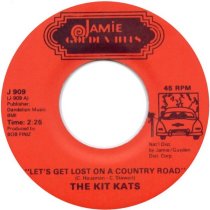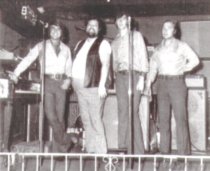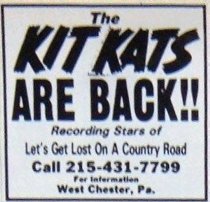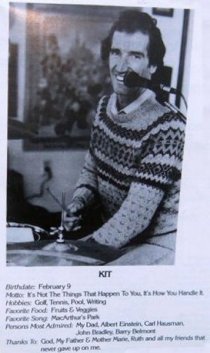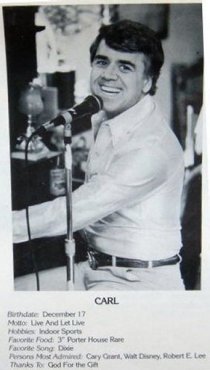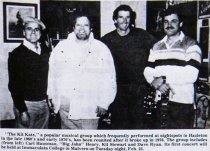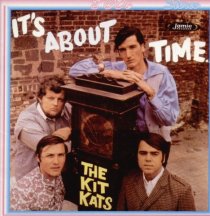|
Such high praise comes from music industry veteran Tom Kennedy,
head of promotions at Jamie Records during the Kit Kats' legendary
run there. Kennedy's memories of the band are not unique;
he eloquently summarized the feelings of many of the Kit Kats'
fans and associates. But these sentiments raise a host of
questions: Who exactly were these four extremely talented
musicians? If they were so great, was an unfortunate band
name really enough to stop them from making it? And if indeed
they didn't make it, why does anyone still care about them
today? These questions and many more will be answered shortly.
Forget everything you thought you knew about the Kit Kats
- what you are about to read will blow your mind.
John Bradley, a native of Bristol, Pennsylvania, was the son
of musician and entrepreneur Harold Bradley. Harold's shop,
Brad's Music Store, was located on Kensington Avenue in Northeast
Philadelphia, and John could often be found hanging out there.
One friend that John made at the music store was Karl Hausman
[1], a young piano prodigy
from Fishtown, a working class riverside neighbourhood in
Northeast Philly. Karl and John were both 13 at the time.
Karl went on to play professionally starting at age 14, while
John honed his guitar chops in a band called the Chancellors.
In the summer of 1958, a 16-year-old Karl joined the Chancellors;
however, John went into the Army the following year and the
band broke up. Karl got a desk job until a rockabilly band
from Ft. Wayne, Indiana asked him for help. Roscoe & the
Green Men were working in the Philadelphia area, needed a
new pianist, and just so happened to hear about Karl. When
he joined this band, he had to adopt a gimmick that was most
unusual at the time. You see, every one of the Green Men had
green hair. [2] Karl toured
with the band for a year; thanks to highly effective representation,
they got to play on The Johnny Cash Show in Canada.
Karl would even stay at their manager's house in Ft. Wayne
whenever the rest of the band went home on breaks. It's remarkable,
then, that the combo spent the entire summer of 1960 in Seaside
Heights, New Jersey, and thus recorded Karl's only single
with them in Philadelphia. This release paired a cover of
'Roll Over Beethoven' with a revival of the mouldy oldie 'Bye
Bye Blues' and came out on the obscure Pontiac label. It was
not enough for Karl, who felt like the group was not moving
"onward and upward" and decided to leave.
WE'RE GONNA BE THE KIT KATS
The year 1961 saw Karl going back to a desk job, miserably
playing the part of responsible young adult like everyone
wanted him to. Everyone but his mother, that is. She encouraged
him to follow his passion for music; luckily, John had just
returned from his term of service and re-formed the Chancellors.
Now 19, Karl re-joined John's band and they played on weekends
in Northeast Philly bars. Enter Carson Wesley Stewart, Jr.
and Ron Cichonski. [3]
In his childhood Carson had earned the nickname Kit Carson,
hence his more common moniker Kit Stewart. Ron, meanwhile,
was not about to explain to every non-Polish rock'n'roll fan
that his last name was pronounced "shi-HEIN-ski",
so he adopted the stage name Ronnie Shane. Kit had learned
to play the drums after getting out of the Navy, and Ron had
a way with a Fender bass. Kit was looking to form a band,
so he and Ron visited Brad's Music Store and asked Harold
Bradley if he knew of a guitar player. Of course, Bradley
recommended his son. When Kit and Ron attended a Chancellors
gig to check out John, Kit was also impressed by Karl's piano
stylings. Kit hadn't considered a piano player, but he had
to invite this great talent to join his new group. As Karl
recalls, "Kit came over to me, he said, 'You know, I'm
starting this group. We're gonna be the Kit Kats.' And I said,
'Hold it right there. I don't like that name.'" The name
was not derived from the candy bar (a UK brand that was not
licensed for the States until 1969), but Karl does remember
that "there were famous Kit Kat clubs around the world"
and concedes that "it worked well with the kids when
the records did come out. The name was, we didn't use the
expression back in [the early '60s], but it was kind of bubblegum."
So why didn't he like it? "I just thought it wasn't macho
enough. It sounded light and airy." [4]
John left the Chancellors to join the Kit Kats, who at this
time also included a sax player named Bob Seeger (note the
spelling!). But Karl was not convinced that he should join
until he saw the new band and was quite surprised by how good
they were. He was particularly impressed by John's singing
voice, which John had kept under wraps in the Chancellors.
So, in February of 1962, Karl joined the Kit Kats. Drawing
upon Kit and Karl's natural strengths, the band established
a division of labour: Kit was the one who sold the band and
did the bookings, whereas Karl was the group's arranger. Also,
the Kats made it a point to respect each other's song choices.
Karl: "We agreed in the beginning, whatever a guy wants
to learn, bring the 45 to rehearsal, and we'll learn it. We
will not argue."
CLUB 13
Through an agent named Herb Lustig, the Kit Kats were able
to start moving beyond the Northeast Philly bars to a downtown
venue named Club 13. They worked there Monday through Saturday
and began to learn what really goes on after hours. Karl has
vivid memories of the weekends at Club 13: "Friday night
and Saturday night, when we were done at 2am, part of our
contract was, we would go upstairs and there was a private
club that started at 2am, and we'd start playing up
there. But there they had some pretty bizarre shows! Like,
we would take a break and on would come a female stripper.
And by the end of her act she takes off her pasties - and
it's a guy! And all of a sudden, we looked at each other -
I thought, 'Hey, I'm from Fishtown, but we didn't have this
sort of thing in Fishtown!' So we had to admit, I was a little
surprised! And the audience was, like, old fat bald guys with
cigars, with young blondes! It was like, all these sugar daddies!"
In the summer of 1962, the group really started to morph into
what we now know as the Kit Kats. For one thing, Bob Seeger
had to be dismissed from the band. It was nothing personal,
but he simply had a hard time tuning his sax to whatever pianos
were available at the venues they played. There were no hard
feelings, and Karl thinks that Seeger went on to become a
lawyer. On July 4th, 1962, the four-piece Kit Kats line-up
made its debut. The last days of summer marked yet another
historic debut by a fabulous foursome: the 4 Seasons with
their first hit, 'Sherry'. The Kit Kats initially encountered
disaster while trying to cover it. Karl sang lead on it originally,
but being a natural baritone without Frankie Valli's amazing
falsetto range didn't help one bit. "I sounded like I
was yodelling," he jokes today. So at rehearsal, Karl
suggested that John sing it. He was amazed by what he heard.
"He sat there and naturally sang in his own voice and
went all the way up," Karl marvels. "I said, 'You're
not even singing falsetto, that's your VOICE!'" In fact,
Karl insists that John's freakish range was totally natural:
"He couldn't go falsetto, he didn't know how!"
Even harder to fathom is that Karl started out giving John
bass vocals - and John was happy to sing them! No more bass
vocals for John; from now on, John would sing tenor or even
soprano, Kit would handle the macho bass and baritone lines,
and Karl would sing baritone or even lay a falsetto on top
of John's high-pitched wailing. With the distinctive characteristics
of each voice, the Kit Kats had some unusual harmonies indeed.
Where was Ron in the vocal mix? "He never showed an interest
in singing," says Karl. "When he did sing, we would
give him bass parts, or if there were songs that would need
a vocal intro, like he would do 'Hee hee hee hee, wipe out!'"
Karl recalls that as the years went by, Ron developed a greater
stage presence in an unlikely manner. "Now, Ronnie DID
sing 'Woolly Bully'. That was his big claim to fame. It got
to the point where the crowd was always yelling for 'Woolly
Bully', just to hear him do his one song! So it was kind of
a joke. Not the joke with Ronnie doing it, it was kind of
the joke with the crowd, you know, 'Bring Ronnie up here!'
'Cause they all called him 'The Wooden Indian' 'cause he stood
there in the back and never moved. When in reality, Ronnie
himself said that he doesn't wear his glasses on stage, and
he didn't wanna step off the stage accidentally! [laughs]
Ronnie was a funny guy. He was quiet, but when he said something,
he was very funny." [5]
It's worth noting that the quiet Ron never committed his vocals
to any of the Kit Kats' records.
VIRTUE
To pick up where we left off, the band began to develop a
following in the local clubs, and in the summer of 1963 they
were playing at Tony Mart's in Somers Point, New Jersey. Who
should be working next door but Philly rock'n'roll legends
the Virtues. Frank Virtue introduced himself to the Kats and
offered them "free" recording time (to be paid for
through record sales, of course) at his studio. The group
accepted his offer and recorded their debut single in short
order. It was an unusual pairing for a rock'n'roll outfit.
The A-side was a rather arch take on the old novelty 'Aba
Daba Honeymoon', which the band hardly ever played live because,
in Karl's words, "It just wasn't rock'n'roll." On
the flip, meanwhile, was the bluesy instrumental jam 'Good
Luck Charlie', which had even more unexpected roots. Karl:
"Basically, we were doing that old ethnic folk song 'Mazel
Tov' and they changed it to 'Good Luck'. That was Frank Virtue's
idea for the title. I think they just threw Charlie on the
end. Charlie seemed to be kind of a popular thing to say back
then. 'Ah, good luck, Charlie.'" That a little rock'n'roll
band out of Northeast Philadelphia (a part of town not known
for its rich musical heritage, though it pains this Northeast
Philly boy to admit that) could offer up such an eclectic
choice of tunes on its first single proves that the Kit Kats
were a cut above the rest. They cast a wide net in building
a repertoire, and they could play anything and make it their
own. In any case, Virtue arranged for the record to be released
on the mighty New York indie Laurie Records, but a positive
review from a San Francisco critic was about as far as it
went.
So the band went back to business as usual, playing the clubs
and recording sundry tracks at Virtue's. Of course, the year
1964 ushered in the British Invasion, of which Karl remembers,
"We loved it because it gave us a chance to play real
rock'n'roll again." There was a bit of a British Invasion
vibe, mixed in with the band's '50s rock'n'roll roots, on
their second single, 'You're No Angel'. Unfortunately, Virtue
got the 45 released on Lawn, the sister label of Philadelphia's
Swan Records. Swan was once one of the biggies, but it was
now in serious decline without Dick Clark in its own backyard
and Frank Slay on its payroll, and (to paraphrase kindly)
Spectropop hero Jerry Ross once suggested that the company's
executives were better suited to selling shoes than records.
Besides, 'You're No Angel' was a tad dated when released in
the context of late 1964. The flip-side was an early recording
of their later favourite 'Cold Walls', with sparse instrumentation
and 4 Seasons-styled harmonies throughout. Both sides were
original compositions, which pointed to yet another division
of labour: when it came to songwriting, Karl composed the
music and Kit wrote the lyrics. For 'Cold Walls', Kit came
up with a haunting tale of a man who was being released from
a lengthy prison stay to the welcoming arms of his love. Speaking
of love, Karl had none whatsoever for this storyline, hence
comments such as, "Even though I wrote the melody for
it, I really didn't appreciate it until I recorded it myself
instrumentally. And then I listened to it and I thought, 'This
is an absolutely beautiful song!'"
JAMIE
The failure of the second single must have caused frustration
for the Kit Kats, and Karl started pushing for the band to
go to California, believing that the Golden State would be
a better launching pad to stardom. [6]
Kit couldn't work out any deals for the summer of 1965, but
thought that he might be able to set something up for the
winter of '65-'66. Then fate intervened. And fate's name was
Bob Finiz. Finiz had been the boss bass voice of Philly doo-wop
favourites the Four J's, and he was now a staff producer and
engineer at Jamie Records. Jamie was part of a large Philly
music empire owned by attorney Harold B. Lipsius. [7]
His domain included the Jamie/Guyden family of labels, plus
local and national record distributors. Artists like Duane
Eddy and Barbara Lynn, and producers such as Phil Spector,
Lee Hazlewood and Huey P. Meaux had all gotten a huge boost
from recording for, or partnering with, Lipsius. By 1965,
Jamie/Guyden was poised to become the only Philly indie from
the 1950s to successfully survive the onslaught of the British
Invasion and the concurrent rise of the Motown hit machine.
In other words, being noticed by somebody from one of Lipsius'
companies was a big deal.
THE T-BAR
Finiz approached the Kats at The T-Bar, one of their favourite
venues, which was located in Ridley Township, Pennsylvania.
After talking some business with them, he told Lipsius about
this great band he'd seen, at which point Lipsius asked to
hear them on tape. So Finiz returned to The T-Bar and took
the Kats to Jamie's in-house studio after their set was over.
Karl recalls, "I didn't need to take the piano, but he
wanted me to take the amplifiers anyway. That's why the piano
sounds a little tinny on the recordings, because he wanted
it through [the amplifier] like that. And the only reason
I made it tinny was to cut through the guitar. If I'd had
a natural piano sound, you'd have never heard me." And
what kind of amplifier did Karl use? A ukulele pick-up, of
course! It was a trick that he'd learned from Robbie Robertson
of the Hawks (later the Band), whom he'd seen in Toronto when
he was a Green Man, and at Tony Mart's in 1965.
As you know by now, Harold Lipsius was pleased with what he
heard and signed the band. Technically, though, the Kit Kats
were still under contract to Frank Virtue. Lipsius, ever the
skilful businessman, took care of that. Not that the band
didn't like Virtue - as Karl remembers, "He was a quiet
fellow, but very polite, very nice" - but they rightly
believed that Jamie could do more for them. Jamie assigned
Bob Finiz to produce the foursome, and this is where Tom Kennedy
sees a major problem. Kennedy feels that Finiz was better
off producing R&B acts because of his roots in doo-wop.
Kennedy also finds it detrimental that Finiz was left to fly
solo with the Kats, as opposed to his collaborative work on
other artists' recordings (for example, he was under the influence
of Gilda Woods when he produced Brenda & the Tabulations).
Letting his imagination run wild for a moment, Kennedy fantasizes
about what great work Tom Dowd could have done for the Kats,
asserts that Felix Pappalardi would have "torn a new
asshole" with them, and proclaims, "If Koppelman
and Rubin had done the Kit Kats, they would've been the Turtles."
Remember that last one.
Maybe they could have done better than Finiz, but it's hard
to argue with the crash-boom-bang of the Kit Kats' first Jamie
release, 'That's The Way'. Following, of all things, Crispian
St. Peter's 'Pied Piper' in the Jamie singles catalogue, 'That's
The Way' was retro-chic before the concept was in vogue. The
doo-wop influenced vocals and Jerry Lee Lewis-styled piano
kept the boys grounded in '50s rock'n'roll, but Kit's lyrics
betrayed something that is not normally associated with this
band: a punk attitude. "You'd like to hear me say I'd
change my ways for you/I wouldn't change for anyone, things
I like to do! […] That's the way I'm gonna stay, nothing
will change me!" As they modulated almost incessantly
on the final choruses, they displayed a maturing musicianship
that set them apart from most local combos of that or any
other era, while the production included elements that were
distinctly mid-'60s. The Spectorian echo employed by Finiz
gave the record, in Karl's opinion, the feel of an early Sonny
& Cher track, while Finiz also decided to throw in a harpsichord
for a baroque pop feel. [8]
On the flip-side was a rough recording of what would become
the band's signature tune, 'Won't Find Better Than Me', sounding
as close to garage rock as the Kats ever got during their
Jamie days, but still keeping a classical element in Karl's
fast-fingered piano solo. [9]
In all, it was a highly impressive offering, and it paid off.
The record was a hit in Philadelphia and all along the Jersey
shore. Karl also remembers DJ Chuck Raymond of WLAN in Lancaster,
Pennsylvania reporting to the band that 'That's The Way' hit
#1 on that station's survey [10]
and on a pirate radio ship in London!
With such a rockin' Jamie debut, the record-buying public
might have been surprised to hear the sweet, romantic follow-up
'Let's Get Lost On A Country Road' (backed by the swinging
'Find Someone'). Its unconventional melody and arrangement
were inspired by Aaron Copland, one of Karl's favourite composers.
For the solo, John plucked away at a banjo, an instrument
he'd often played when the Kats did their Mummers Medley on
stage. [11] Otherwise,
the record had a full-blown baroque pop production, complete
with strings and horns arranged by Richard Rome. "What
a nice guy," enthuses Karl. "He would sit right
there on the piano bench with me and ask me to play the song
and he would be writing away, putting down the notes that
I was playing, and then he would come back a few days later
with the entire string arrangement." The orchestration
was overdubbed after the Kats laid down all their parts, and
though Karl did not think the additional instrumentation was
necessary, he liked the way it sounded. Nevertheless, the
poppy sound of 'Country Road' indicated a growing disconnect
between the live Kit Kats and the studio Kit Kats. "I
didn't really write driving rock'n'roll melodies," Karl
admits. "We couldn't duplicate what we really sounded
like on stage 'cause we didn't write that kind of music."
Nobody seemed to care. 'Let's Get Lost On A Country Road'
was a big hit in several East Coast markets, Philadelphia
being the biggest of them all. Its regional success allowed
it to make the Billboard charts, although it only "Bubbled
Under" the Hot 100 at #119. [12]
With 'Country Road' riding many regional hit parades, Tom
Kennedy had an idea that he'd just as soon forget: releasing
an instrumental version of 'Country Road' under a pseudonym.
Why? "Because it was such a diversion from what the band
was doing," he explains. "It was really a novelty
approach. I think I heard Karl doing that in the studio and
I thought, 'God, that isn't a pop song, but it IS a novelty
song. It's like a Crazy Otto. That's a different kind of piano,
and if we're gonna do it, let's not put the band in jeopardy.'
I mean, who did I think I was? The 4 Seasons calling themselves
the Wonder Who? But I just felt, you know, we don't wanna
be hamstrung into this sound, and it's too diverse from what
they're doing, it doesn't make sense. We'll put another record
out and we'll just change the name." As it was, the instrumental
'Country Road' had two rides under two different pseudonyms,
and the first time around it was the B-side of a Ramsey Lewis-inspired
workout of 'Hanky Panky'. With regards to Tommy James' then-recent
chart-topping version, Karl recalls, "I liked playing
the instrumental version. I didn't like the hit version because
of the vocal." This single was released in late 1966
under the name the Pablo Ponce Four, a nom de disque
the origins of which are murky; it was definitely chosen around
the time of the recording. 1967 saw a re-release of the instrumental
'Country Road' on the A-side of a 45 bearing the name the
Tak Tiks. Tom Kennedy takes the blame for that one, adding
amidst a sea of laughter, "Now, was that about as clever
a way to disguise the name as you possibly could come up with?"
To add an extra layer of mystery to the proceedings, both
instrumental singles were issued on Guyden. The Tak Tiks'
version of 'Country Road' did reasonably well in Philadelphia.
Returning to our normal sequence of events, the band's third
Jamie single, 'You've Got To Know', came out in February of
1967, and Karl remembers its success being quite limited:
"42 cities in Florida, it was a hit. And nowheres else.
We talked to vacationers who had come back from Florida. Bands
were playing it on the beaches of, like, Daytona, Ft. Lauderdale."
It was a fast soul-influenced dancer, but the finished product
was a bit problematic from Karl's point of view. "I thought,
'It's too goddamn fast!!! How the hell could we have recorded
it that fast??? It was supposed to be slower!!!' I said, 'Karl,
because artists have that problem. You get carried away with
your enthusiasm, the beat goes faster! No one had any idea
what tempo you wanted it!'" Unfortunately, that wasn't
the only thing that was wrong with it. While in keeping with
Kit's growing tendency to write didactic lyrics, lines like
"You've got to know when to give in/You've got to know
when patience is thin," "Every boy should have a
girl who'll see him through," and "There are things
that you must do/If you want to keep him […] And you
know you'll need him, girl" might have come off to members
of the burgeoning Women's Liberation Movement as a clarion
call to all females to be servile to their men. Certainly,
the song hasn't aged well and doesn't stand a snowflake's
chance in Texas of being well-received in the era of political
correctness. In response to these criticisms, Karl muses,
"I'm glad I didn't pick up on that, we'd have had a hell
of a fight. Because I always loved independent women."
So what good can be said about 'You've Got To Know'? Karl
is convinced that it inspired the melody of the Dells' 1968
hit, 'There Is', but doesn't mind that because he liked 'There
Is'. Riding on the flip of 'You've Got To Know' was an altogether
more promising side, an extremely baroque re-recording of
'Cold Walls', adding Richard Rome's orchestration and de-emphasizing
the harmonies. [13]
THE RIPTIDE
The Kit Kats were proving themselves to be a big group on
the East Coast, which led to a rather attractive offer from
one John Caterina. Caterina owned a 1,600-seat nightclub in
Wildwood, New Jersey called The Riptide; as you may have guessed
from Bobby Rydell's 'Wildwood Days', the South Jersey resort
town was successfully marketed to Philadelphians as an attractive
oceanside summer getaway. But Caterina was not pleased with
his club's performance and was looking to improve his fortunes.
In March of '67, he offered to make the Kats summer regulars
at The Riptide, in exchange for which they would receive a
40 percent cut of the club's profits. [14]
They couldn't turn that down, so from Memorial Day to Labor
Day they worked The Riptide seven nights a week plus two jam
sessions on Saturdays and Sundays. This started in 1967 and
continued through 1970, after which Caterina sold the club.
With Caterina went the Kit Kats' deal, but they sure packed
the place during those four years they were there.
May, 1967 brought a new single, 'Breezy', which suffered from
bad timing - and bad titling. How could Jamie have known that
the Association's 'Windy' was being released at the exact
same time? 'Breezy' failed to become a hit anywhere, but with
its French-influenced melody (and accordion solo by Karl)
and breathy vocals it showed a softer, gentler side that made
'Country Road' sound positively bombastic by comparison. It
was also Kit's favourite Kit Kats tune. For the first time,
Jamie sent the band out of town to record it, which they did
at Bell Sound in New York. The flip was a tighter re-recording
of 'Won't Find Better Than Me', which appeared on some radio
station surveys [15],
while aggravating fans who did not want to see a song they
already owned being recycled on the B-side.
IT'S JUST A MATTER OF TIME
It was about time to put together an album, and its title
It's Just A Matter Of Time was Tom Kennedy's expression
of faith that the Kit Kats would soon become national stars.
The rather unattractive front cover was credited to Kennedy
and Max Bodden, but it is the latter who must shoulder most
of the blame. Kennedy: "Max was the art director for
Jamie/Guyden, Phil-LA of Soul. He actually did our graphics
and the artwork. I couldn't deliver a picture, I could only
deliver an idea. I felt that they were just on the brink of
making it, and it was a matter of time. And Max said, 'Well,
look, why don't we put 'em around a grandfather clock?' And
I said, 'That'll work.'" Kennedy reveals that the cover
photo, featuring the guys gathered around a beaten-up clock
with pissed-off expressions on their faces, was Bodden's idea.
It's still a sore subject with Karl, as he groans at the very
mention of it and exclaims, "I, uh, [laughs] I
didn't like it! I remember the morning we went out there,
it was a chilly morning. We went down around 2nd and Fairmount
and found a vacant lot that was junky lookin' and somebody
was there, Bob Finiz was there, somebody showed up with a
grandfather clock!" [laughs] His next statements
are quite telling: "They DID take some nice pictures!
I liked the pictures where we smiled, you know, we looked
great. We looked like the band was, we made people feel good.
They picked the one that looked like we just went to our own
funeral! We weren't that kind of band to say, like, we're
bad!" There's a certain innocence to these comments
that stands in stark contrast to the angst-filled cover shot.
Indeed, the Kit Kats faced a problem that all good-time bands
were forced to confront in the mid-to-late '60s. The times
had become more turbulent, and rock music's trendsetters were
no longer content to purvey songs that served as an escape
from life's problems. As audiences responded to these artists'
opuses of frustration, alienation, and disgust, they also
found comfort in the rough and tumble bands whose "bad"
attitudes reflected most listeners' inner turmoil. But the
Kit Kats weren't interested in that. All they wanted to do
was have fun and get you to have fun with them. They didn't
even do heavy drugs because, as Karl himself will gladly attest,
they were turned off by the effects such substances had on
others. A music act that wanted to be so happy and clean-cut
could have found a niche in the world of bubblegum, but the
name the Kit Kats is as close to bubblegum as that band got.
So where exactly did the Kit Kats fit in? On the Philly scene,
this was not as much of a concern; after all, pure doo-wop
records were still becoming local hits, and edgier styles
like garage rock and psychedelia were mostly imported from
other cities. But as Tom Kennedy pointed out, Jamie held high
hopes of breaking the Kit Kats nationally with It's Just
A Matter Of Time. It's likely that Max Bodden was painfully
aware of the Kit Kats' potential for image problems on a national
scale; why else would he have chosen such an ugly cover photo
to depict a band that made such beautiful music?
Indeed, the music contained on the album was much more appealing
than the packaging. Aside from all the Jamie A and B-sides
(save for the 'Country Road' flip, 'Find Someone', and the
original 'Won't Find Better'), there was a mind-bogglingly
eclectic selection of covers, all of which came out sounding
like no one but the Kit Kats. 'Nut Rocker' (a complete feature
on which can be found elsewhere at Spectropop) was the band's
set opener for many years, and it would also be used as the
B-side of the Tak Tiks single later in 1967. [16]
The folk tunes 'Cotton Fields' [17]
and 'Liza Jane' got rocked up; Karl picked up the latter from
Ronnie Hawkins & the Hawks. It was a real barnburner which
the Kit Kats used as a set closer when Karl got tired of ending
with 'Goodnight, Sweetheart, Goodnight'. Tom Kennedy remembers
how powerful their live version was: "[Karl would] bang
the shit outta the piano and John would sing it in the key
of Q! And the place would shake for 3 minutes after they stopped
playing." Karl agrees with Kennedy that the recording
was missing one essential element: the crowd! Karl had also
picked up a 45 of the Ivy League's 'Funny How Love Can Be'
and presented it to his bandmates as a possible cover choice.
Their rendition is breathtaking, especially with the band's
full harmonies and Richard Rome's orchestration, but since
the original version had not been a hit in the US, people
thought the Kit Kats had written it. 'These Are A Few Of My
Favorite Things' was the strangest inclusion, but it was a
staple of the band's opening sets, when they played non-rock
while people drank and started rocking when people were ready
to dance. Karl believed it would work for the Kats: "I
said to the guys one day, 'Why don't we do something like
show tunes? We're not Broadway guys, but we could certainly
do something classy.' So I happened to come upon that one
and I said, 'This would be great with three-part harmony.'"
Bob Finiz considered it worth including on the album to show
the group's versatility, and that it does. 'Sea Of Love' was
an obvious choice for a band whose roots were in '50s rock'n'roll,
but their unique arrangement of it came about through a gradual
evolution. They had been performing it since the beginning
of the group, but after a few years Karl decided it needed
embellishment. They started jamming on it, and one time Karl
asked Kit for a drum reprise at the end, after which Karl
let loose with a piano solo and the others fell in. Add some
higher-than-high harmonies and a few light orchestral touches
and you have the most distinctive version of this oft-covered
chestnut ever recorded. (A September single release, which
faded early on Karl's piano solo, would muster up enough regional
success to hit #130 on Billboard, and a Canadian
pressing on the Apex label did quite well north of the 49th
parallel.)
It's Just A Matter Of Time came out during the Summer
of Love in a reverb-drenched mono edition and a "stereo"
pressing that was entirely re-channelled. The back cover identified
John as Big John, the nickname he had earned due to the changes
wrought upon his body by too much of la dolce vita,
while Karl, who had never requested an arranger's credit,
was surprised and flattered to receive one anyway. Like most
'60s albums, It's Just A Matter Of Time contained liner
notes full of endless praise, bragging, and a little hyperbole
for good measure. Quotes from deejays, program directors,
and distributors all over the East Coast made the Kit Kats
sound hotter than a bunch of jalapenos. "[S]ales of 37,000
records of 'Country Road' in Philadelphia alone was proof
enough that this group is where it is," wrote Jim Hilliard
of Philadelphia's famed WFIL. Dean Tyler of 'FIL rival WIBG
(a.k.a. Wibbage) gushed, "[T]hey happen to be four of
the nicest guys it has ever been my pleasure to meet in 16
years in radio and TV." [18]
Kerby Scott of WBAL in Baltimore even offered a stern warning
to the Beach Boys: "The Kit Kats are one of the few groups
with enough talent and showmanship to bring the scene back
to the East Coast - California beware!" Not surprisingly,
It's Just A Matter Of Time didn't exactly become the
next Pet Sounds. It did hold its own in the Philadelphia
area, however, where Karl claims it sold over 80,000 copies.
THE VIRTUE ALBUM
It's Just Matter Of Time may have had to go up against
Sgt. Pepper that summer, but in the fall it had a much
more immediate competitor. Frank Virtue gathered up 'You're
No Angel' plus 11 outtakes from 1963-64 and released them
on his own label under the deceptive title The Very Best
Of The Kit Kats. Much of the album suggests that the Kats
were originally R&B-oriented, though Karl admits that
"it just turned out that way, although we didn't have
R&B voices. Our voices were simply too - we weren't gravely
enough." Still, their rockin' renditions of Little Richard's
'Hey Hey Hey Hey' and 'Lucille' and the old Chubby Checker
hit 'Good Good Lovin'' showed that they did have an understanding
of rhythm and blues. They also cut an R&B-styled take
on 'The Quiet Village', which featured the band making intentionally
goofy bird call noises. The Virtue-penned instrumental 'The
End' also brings in an R&B stomp, while their faux Merseybeat
reworking of 'Stranded In The Jungle' sounds like a lost You
Know Who Group recording. The band used to put on shows during
their sets, hence the English accents and banter on 'Stranded',
but Karl feels that it didn't quite come off on the record.
The original material on the album indicated something different
altogether. The unusually sombre, pensive 'Our Farewell' was
firmly in the white doo-wop tradition - complete with Karl's
melodramatic spoken passages - while 'From Here On In' comes
closest to indicating the retro-contemporary direction the
Kats would take at Jamie. Nevertheless, the Kats were embarrassed
by the raw, primitive recordings on the Virtue LP and asked
Virtue to pull it. Having no reason to do so, he didn't, and
the band could only watch helplessly as fans purchased an
album that siphoned sales away from their Jamie output. [19]
Around this time, Bob Finiz disappeared to California, leaving
the Kit Kats without a producer. That wasn't the only change
in store for the band's next 45; 'Distance' was the first
single not written by Kit and Karl since 'Aba Daba Honeymoon'.
The song had been cut by Spanky & Our Gang on the B-side
of 'Sunday Will Never Be The Same', and it had some important
Philly connections. For one thing, it was written by prolific
arranger/composer/musician Joe Renzetti and the Spokemen's
Ray Gilmore, who was also a DJ on Wibbage. Additionally, Spanky's
version had been produced by Jerry Ross. Karl says this cover
choice "was more or less set up with Kit talking to Jamie"
and that the Kats didn't really appreciate the song until
they learned it. Jamie sent them to New York to record it
with Renzetti doing the arrangement and Artie Shroeck producing.
Karl has vivid memories of the demanding Shroeck: "He
was a taskmaster, but he made sure that when it was over and
done with, we were glad he did. What he did was get out of
you what you didn't know you had. And that was the interesting
part about it. You understood when it was all over."
Karl was not aware of Shroeck's impressive résumé
(including arrangements for one of the Kit Kats' favourite
bands, the 4 Seasons) until after the fact: "He was not
a braggart, just a regular person. Which impressed me even
more! I liked that." The winning combination of Shroeck,
Renzetti, and the Kit Kats made for an excellent piece of
ragtime sunshine pop, with John's chugging guitar, Kit's swinging
drums and a thick wall of background harmonies; it was a much
livelier reading than Spanky & Our Gang's languid, morose
rendition, but John's lead vocal retained an appropriate amount
of pathos and anger for the lyrics. Also, Shroeck's production
included the only backwards tape effect ever to be found on
a Kit Kats record. Unfortunately, the single failed to catch
on anywhere.
As 1967 turned into 1968, the band nearly came apart at the
seams. Kit, the businessman of the band, was becoming somewhat
more ambitious. On the plus side, he produced the Cole Brothers,
the Kit Kats' alternate band down the shore, for Jamie Records.
[20] On the minus side,
he got the idea to record John with session musicians - a
means of pushing John as a star vocalist - while still crediting
these records to the Kit Kats. This led to such highly unrepresentative
singles as a heavily orchestrated cover of Neil Diamond's
'I Got The Feelin' (Oh No, No)', a silly piece of piffle entitled
'I Want To Be', and the cheery Cowsills-like 'Hey Saturday
Noon'. [21] None of these
singles made a commercial impact, and Tom Kennedy offers a
good explanation why: "You would never have to take any
one of [the Kit Kats] off the session to make it sound right,
no matter who was producing it. There were concessions to,
you know, 'If we spend more money on musicians, maybe we'll
get a better sound.' And it wasn't terribly expensive, but
it was a roll of the dice, and I think it just proved a point
that augmenting them with studio musicians wasn't going to
improve their sound that much if they weren't the nucleus
of what was happening."
There were two 1968 sides on which the Kats were the
nucleus of what was happening. Their swinging, mildly funky
reworking of the Beach Boys' 'You're So Good To Me' was an
obvious choice to record. As Spectropop's own Steve Harvey
(not to be confused with the famous comedian) once recalled,
"Kit Stewart told me they used to do that as a stomper,
it was a real 'smack your feet into the floor of the club'-type
tune." Karl got his arranger's credit on the single,
but he was annoyed to see Kit credited as producer. "I
said, 'Kit - where do you get producing? You came in as a
studio musician same as we did.' He said, 'Well, you know,
it was my idea to do the song.' I said, 'Why don't you have,
'Based upon an idea by Kit Stewart?' You didn't produce this
- the band produced it!'" Karl has much fonder memories
of the mixing process: "I remember when it was being
mixed, and I said [to engineer Joel Fein], 'Do me a favour.
Everything we have ever recorded sounds like it has no bass
in it. Can you turn that knob up a little higher?' And he
said, '[forebodingly] You're gonna push it into the
red.' And I said, 'Put it into the fucking red! Please turn
that knob!' And he said, 'Okay.' And you know it's the one
song [we] recorded that actually has balls!" Maybe so,
but the commercial success of 'You're So Good To Me' was confined
to the Jersey shore - not enough to make it sell notably.
[22]
The flip-side was a source of great resentment between Karl
and Kit. Donnie Owens' 'Need You' had been one of the few
hits for the Guyden label back in 1958, and it was a favourite
of Karl's. Of all the live numbers that featured his lead
vocals, 'Need You' got the most requests. It was a no-brainer
to record, but when Karl heard Kit's florid production of
the finished product, he was furious: "I wanted it to
be like the Donnie Owens original version. Simple acoustical
guitar, me singing it, brushes on the drums, and light bass.
And I said, 'That's all, that's all.' And I said, 'You give
me these frickin' strings, all this kinda crap you put the
hell in there,' and he said, 'Well, you know, I wanted to
fatten it up.' I said, 'Who the hell died and [made] you boss?
I did the arrangements in this band and it did pretty goddamn
good! You were the one that sold the band, but I gave you
one hell of a product to sell. All of a sudden you decide
that you're Mr. Producer!'" For what it's worth, Kit
finally admitted that he had indeed ruined 'Need You' …
a mere 32 years later.
FINIZ RETURNS
It wasn't just internal tension that threatened the band's
well-being. 1968 saw the return of Bob Finiz, who sued the
Kit Kats for not paying him as their manager. Never mind the
fact that Finiz didn't manage the Kats; they still
had a percentage of their salaries held in escrow until the
matter was settled. That is, if you can consider the
matter settled. Karl picks up the story from here: "The
bottom line on the thing was, we all go to court and Bob Finiz
WINS! He wins, but get this - we not only didn't get our money
back, HE didn't get any money back, it got locked up between
the judge and the lawyers! And that's what Bob Finiz said,
because we said, 'You son of a bitch, how the hell could you
do something like that?!?!' He said, 'Well, guys I really
didn't wanna do it, but I was told I was within my rights.'
I said, 'You had no rights! You were no manager! You were
with the recording end, but you CERTAINLY didn't manage us!'"
With the hard feelings long over, Karl now maintains that
Finiz was put up to suing the band, though he doesn't know
who put Finiz up to it. [23]
Even amid such turmoil, the Kit Kats continued to be a huge
draw in person. Their set list was always eclectic, with such
crowd favourites as 'Malaguena', '500 Miles', the 4 Seasons
Medley and a host of Motown hits. (In later years, performances
of Abbey Road and Tommy were real crowd pleasers
as well.) Big John, the only non-smoker in the band, proved
to have amazing stamina, never finding the high notes a challenge
unless he had a cold. Tom Kennedy is still dazzled by the
memory of their live shows: "People hated to hear the
last song. They just got on stage and perennially cooked through
the whole set. They were dynamite in person, and the amazing
thing was, if Finiz was getting something on the records that
sounded big - they were getting it in person. Their sound
in person was probably as good as, if not better than, their
recordings. I don't think [the recordings] could capture the
fullness of the band." Kennedy also remembers how, in
a matter of seconds, the Kats were always ready to rock'n'roll:
"There were a lot of bands that, when they came on, they
spent an eternity tuning up, soundchecking … it was annoying.
In my eyes, it was very unprofessional. When the Kit Kats
came on stage - I don't know if they waited out in the parking
lot and tuned everything up - but they got on and in a
minute they were ready to play and they were right on."
The band always took great pride in developing a personal
rapport with their fans, especially with Big John walking
out into the crowd and greeting people or joking with the
audience from the stage. As Kennedy recalls, "You know,
they had such a following, it was almost like a first-name
basis. John would point - 'Johnny, welcome!' - you know, and
he'd point to a guy. I mean, it was a following and
they were very connected with their audience." So popular
were the Kit Kats in person that they even found themselves
becoming the subjects of tributes. Karl: "There was a
group who used to play in the Philadelphia/Jersey/Jersey Shore
area called Jimmy & the Tropics. They would do a whole
Kit Kats medley. Matter of fact, they're still together. They
would warm up or play during our breaks, or we would alternate
with them, anyway you wanna put it, if the place would have
two bands. They actually surprised us one night. They said,
'Would you stick around and listen to our set?' And they did
the Kit Kats Medley and they had been doing it for quite a
while. I just couldn't get over it. I felt embarrassed, I
felt like, 'Why would you want to do that?'"
DO THEIR THING LIVE
It made sense, then, that the Kats' next record - indeed their
only release for most of 1969 - was a live album. The Kit
Kats Do Their Thing Live was recorded in November 1968
at The T-Bar, and featured none of the group's hits. Instead,
it contained an incredibly diverse list of covers, from the
Roy Orbison hit 'Candy Man' (featuring Karl on harmonica)
and the Mamas & the Papas' 'Words Of Love' to 'Great Balls
Of Fire', 'We Gotta Get Out Of This Place', 'Little Queenie',
'Those Were The Days' and an almost psychedelic reading of
'Distance' (prominently featuring the Rock-Si-Chord, an electric
keyboard that Karl set up on top of the piano). The inclusion
of Phil Ochs' 'Draft Dodger Rag' showed the band incorporating
topical songs into their repertoire, but don't think the Kats
were suddenly getting political: "It was just the times,"
explains Karl. "We never discussed politics. We never
knew how each other voted or anything like that. I don't even
know if the other guys even voted!" [24]
The live album may have captured the group's versatility,
but the sound quality was nothing to cheer about - even though
it was true stereo. "It was so much treble,"
moans Karl. "It sounded so tinny that it was actually
horrible. I think what they did was actually record it just
the way it was, but there was no bass in there. The piano
sounded like a harpsichord on that album!" Furthermore,
the back cover made the stupid mistake of claiming that The
T-Bar was located in Broomall, Pennsylvania, a factual error
that has muddied the band's history ever since. Nonetheless,
the album sold very well in the Philadelphia area and down
the shore upon its release in early 1969.
NEW HOPE
A fortunate turn of events for Jamie also proved pivotal for
the Kit Kats that year. Jamie/Guyden picked up a small Florida
label, Sundi, whose release of Mercy's 'Love (Can Make You
Happy)' was burning up the charts in the Sunshine State. With
Jamie's distribution, the record became a national smash in
the spring and summer. One of its producers was the eccentric
Mike Apsey, who convinced Harold Lipsius to hire him to work
for Jamie. He became the Kit Kats' new producer, although
it was not quite as cosy an arrangement as the band had once
enjoyed with Bob Finiz. Whereas Finiz attended the band's
shows frequently, Apsey was only an occasional spectator.
The Kats had socialized with Finiz, while their relationship
with Apsey was more businesslike. Apsey seems to have been
more interested in Karl than the rest of the group; he would
call Karl into the studio to add background parts or smooth
out rough edges after the foursome had laid down their tracks.
Nonetheless, the producer had one hell of a trick up his sleeve:
recording yet another version of 'Won't Find Better Than Me'
to be released undoubtedly as an A-side. Karl came up with
a gorgeous new arrangement, placed firmly in the soft rock
vein but with all the elements of the Kit Kats' sound: powerful
drumming, country-rock guitar work, lively bass, and classical
piano. A slight Latin tinge made the record all the more distinctive.
The band's signature harmonies were as strong as ever, but
Karl reveals that he played a bigger role in them than usual:
"On 'Won't Find Better Than Me', I'm the only one doing
background. We eliminated the three-part harmony that was
on there, and I think I said, with no - you know, not cutting
out the other guys - but I said, 'Bottom line is, we want
it to sound better.' And so what I did was just work with
Mike, and I just kept doing vocals in layers ... 3 of my own
voices, and that's it. And it worked out fine." Since
the song had already been out twice under the Kit Kats name,
Apsey (credited as Mike for some reason) thought that a new
name was in order. New Hope, Pennsylvania was (and is) a small
town known for its tourist-baiting arts scene; thus Apsey
chose to rename the band the New Hope, which was later shortened
to New Hope. Karl was happy to lose the Kit Kats moniker,
but he didn't think New Hope was much of an improvement: "I
said, 'Mike, you have to look at it as a cynical Philadelphian.
People are gonna call us No Hope!' And sure enough, we did
[veteran Philly deejay Ed Hurst's afternoon dance show]. So
one day he introduced us as New Hope and he said, 'Oh! I almost
said No Hope.' I said, 'Son of a bitch, I was right!'"
Fortunately, the band lived up to the name New Hope, not No
Hope. The new 'Won't Find Better' was released at the end
of 1969 and, in the biggest development yet in the group's
lifetime, made Billboard's Hot 100 in January of 1970.
It peaked at #57 in a nine-week chart run, but it was a much
bigger hit in many cities across America. Why did this record
do so much better than anything before it? Karl's answer is
simple: "I think it sounded good." At any rate,
Jamie rewarded the guys by sending them on all-expenses paid
trips to the record's biggest cities whenever the band was
available. It's worth noting that at the clubs back home,
the group stuck with the name the Kit Kats because it was
still a draw under that name.
The next New Hope single came in April, and it was a peculiar
offering. 'Rain' was a catchy tune from outside writers, but
its soft rock sound was a tad too sweet and polished; not
surprisingly, the instrumental tracks were cut with session
players. John, Kit (who takes the lead on the bridge), and
Karl were the only Kit Kats on this record, and their contributions
were strictly vocal. Even though it followed a hit single,
'Rain' failed to make a splash. Oddly, the B-side was 'Let's
Get Lost On A Country Road' with horn overdubs, showing that
Mike had a somewhat unhealthy obsession with the Kit Kats'
oldies. Karl remembers that Mike "liked our old material
and wanted to do 'em over again. And even I said, 'Why? Kit's
got songs, I've got songs … we've got a whole bunch of
new stuff'… but somehow they felt like they should [laughs]
just take our old songs, basically, and take some of the echo
off. And that was it! And then of course we re-recorded some
of the songs."
TO UNDERSTAND IS TO LOVE
These bizarre ideas led to a mess of an album. To Understand
Is To Love (commonly referred to as The New Hope LP)
was released in August to undeservedly good sales. The album
was a pathetic mishmosh that was never quite what it seemed
to be. Apsey had Karl record a long piano-and-harmonica intro
for 'Won't Find' and tacked it onto the main track; somebody
(perhaps Kit) also added an unnecessary tambourine overdub.
'Gregorian' was simply the first verse of 'Won't Find' sung
like a group of monks; it was intended as a joke but even
Karl found it embarrassing. 'You're So Good To Me' was included
in a weak stereo mix that surgically removed the 45 version's
"balls", while Apsey presented 'Distance' in stereo
with the first half of the intro lopped off. 'Country Road'
appeared with the original mono 45 master drowned in obtrusive
stereo horn overdubs, while 'Breezy' was resurrected in mono
with some stereo elevator music thrown on at the beginning.
The guys re-recorded 'You've Got To Know' in a deliberate
tempo meant to rectify the excessive speed of the original,
but the new version lacked the original's fire. 'Find Someone'
also got a needless makeover, with smoother but less interesting
harmonies and an instrumental tag that segued awkwardly into
'They Call It Love', the dull soft popper that had occupied
the B-side of the first New Hope single. [25]
The ridiculous 'Won't Find Better Than Me Medley' was not
even supposed to be released, nor did it take shape as originally
planned. Karl had the idea to do 'Won't Find' in the styles
of various '50s artists, with each singing Kat taking his
turn on lead. However, Apsey insisted that he had to leave
town and rushed the band to finish the album; thus, Karl sang
all the 'Won't Find' segments and Apsey broke them up with
snippets of the Kit Kats' covers of 'Need You' and Bertha
Tillman's 'Oh My Angel'. [26]
Karl's memories of this artistic misfire are understandably
bitter: "It wasn't supposed to happen. It was just something
I came up with and thought it'd be fun to do for the hell
of it, I think for our own enjoyment. Give the guys each a
copy and send us home. And he stuck it in the album and I
thought, 'Nobody's gonna understand this! It makes no sense!'"
With 'Rain' also on board, the album was starting to look
like a loser. Fortunately, the fantastic foursome provided
two new originals that showed promise - even if they were
both rather extreme departures from the Kit Kats' formula
of churning out goodtime pop tunes with traditional boy-girl
storylines. 'Look Away' was a long, progressive pop opus with
extended instrumental passages and choir-like vocals. Kit's
lyrics were so obsessively preachy that they bordered on nitpicking:
"People talking everyday, but ask them what they want/Speak
their minds in every way, but never lift a thumb/Always want
to have their say, but saying's all they want." But the
point that some people talk a great talk and never actually
do anything was a good one, and the musical experimentation
was really the main attraction of the recording. Karl's vibrant
piano and accordion solos ('Won't Find Better Than Me' is
in there somewhere) were complemented by some very cool bagpipes,
which came about because Karl wanted to go for a Scottish
marching band feel. To achieve this end, Jamie hired Rufus
Harley, master of the jazz bagpipes. [27]
Karl has fond memories of the off-the-wall jazzman: "I
remember, he comes down - a really elegant guy, you know,
and he had one of these Yemen-type caps on, and he goes into
the office and he says, 'Yeah, I'll do the session! I got
my bagpipes with me … I want 400 dollars.' Jamie says,
'Will you take 100?' He said, 'Sure!' So that was a quick
settlement! So he comes upstairs and he said, 'Uh-huh! Glad
to be workin' with you guys!' And we said, 'Oh, we're honoured
you're here!' And the funny thing, he really just made us
laugh when he opens up the case, takes out the bagpipes and
says, 'We'll be in business soon as I blow these motherfuckers
up!' [laughs] So anyway, he did, and he played right
along with us, and we had a fun afternoon with the guy."
Fun was not in order for the other new selection, 'The Money
Game'. Though rock critic Richie Unterberger resists no opportunity
to compare this track to the Easybeats, it was actually inspired
by the Beatles. Karl had composed a soft and lilting melody
a la 'Martha My Dear', but Kit's lyrics were unexpectedly
hard-hitting: "All the things that I've been thinkin',
all the things I say/No, I never would be heard, no, without
the money game!" So Karl upped the ante on the arrangement:
"I said, 'John, get a fuzz-tone. And I want Kit to do
his boom-bum-bum-boom,' which is basically a strip beat speeded
up. And I said, 'I'll just do the piano more classical.'"
Kit laid down a vicious lead vocal, and the track rocked harder
than anything the band had previously committed to vinyl.
The two "statement songs" were paired on a 45 that
August, but 'Look Away' rode on the A-side in a most altered
state. As Karl laments, "I rode with Harold Lipsius to
New York, and we took it up to a studio - I don't remember
which one ... we spend the afternoon while we watch the engineers
MURDER MY BABY! And I told them, 'You murdered my baby!!!'
And the engineer looked at me and he said, 'Ah, you Beethovens
are all alike! Look, you hand me a seven-minute song, I gotta
cut it down to three - don't worry so much! It'll sound great
on the jukebox!'" That engineer was wrong. The 45 edit
of 'Look Away' was indescribably horrible; the word "abomination"
does not even come close to explaining what a pointlessly
embarrassing train wreck it was. Not surprisingly, it tanked,
and that proved to be the last straw for the band. They were
disillusioned that they had not become bigger after so many
years and depressed that Jamie could not build on the new
hope offered by the success of 'Won't Find Better'. They'd
had great expectations for 'Look Away', but the failure of
that song put them further in the dumps than they'd been in
a long time. They were ready for a change, and one was about
to come their way thanks to an extremely unlikely source.
PARAMOUNT
In November of 1970, Kit received a phone call from a producer
who wanted to offer the band a deal with Paramount Records.
That producer's name was Bob Finiz. Finiz was now working
for Koppelman-Rubin Productions and had contacts at Paramount,
a label he believed could promote the Kats better than Jamie.
The band still felt the sting of the lawsuit, but Finiz made
nice with them and set up a meeting with Charles Koppelman
in New York. Koppelman asked the guys to return to the Big
Apple and do a live show for some of Paramount's staff, which
they did in early 1971. Duly impressed, Paramount agreed to
sign the group, who reverted to the name the Kit Kats because
that was still the name under which they were the biggest
draw. [28] Finiz took
them into Media Sound Studios in New York to cut their Paramount
debut, 'Taking My Time'. It was a simple number, but Kit's
lyrics really packed a punch. With lines like "People
talkin' and they wonder why I don't have time to make some
money," and "Taking my time, taking it slow/Nobody's
shown me where to go," it was the unmistakable anthem
of the average American 20-something: he's confused and desperate
to find a direction in life, but people would rather bug him
about it than actually help him find something he can really
sink his teeth into. You might consider it a close cousin
of the Beach Boys' 'I Just Wasn't Made For These Times', except
Brian Wilson was in his twenties when he wrote that
tune, while Kit was a full 31 years old when he penned the
lyrics to 'Time'! And Kit's inclusion of the line "I
fill my body with the magic wine, I wonder why my life's still
lonely" raised Karl's eyebrows: "I listened to this,
I said, 'What, are you on drugs now?' He said 'No!' [laughs]
I said, 'Your lyrics have changed! It's no more June, croon,
spoon, honeymoon crap!'" Sadly, the potent lyrics
and Karl's strong melody were sabotaged by Bob Finiz, who
insisted on an annoyingly gimmicky arrangement. Finiz called
for tempo changes, abrupt stops and starts, and a fast cadence.
Karl: "I said, 'For Christ's sake! It's not a march!'
By the time it was finished, it sounded more like I could
picture the seven dwarves marching …" Karl does
admit that he asked for the goofy horn overdub (which was
done at Finiz's house in Cherry Hill, New Jersey), but he
also admits that it "sounds dumb now." There were
some tasty Rock-Si-Chord passages, but Finiz edited out the
lengthy psychedelic instrumental breaks so that the song would
clock in at slightly over two minutes - an unnecessarily short
running time for an early '70s single. Still, 'Taking My Time'
had a lot to offer, and with the promotional backing of a
larger label it stood a good chance of taking off. Released
in the fall of 1971, it went absolutely nowhere. "Not
a great promotion staff, Paramount," moans Tom Kennedy.
"That was Famous Music, and I don't think they could
deliver lunch in a bag."
Too bad, because the B-side of 'Taking My Time' was an especially
delicious feast. 'That You Love' came totally out of left
field, with lyrics like "I know what I have to be and
it offends you/It ain't natural, so you say/For someone to
love my way/If you think I'm wrong, I wish you'd understand:
it's not who you love, it's not how you love, it's that
you love." The song was of course light years ahead of
its time, and it was written solely by Karl [29],
which is quite surprising in retrospect. After all, Kit had
clearly developed an interest in statement songs, but what
possessed Karl to get on his soapbox as well? As it turns
out, Kit had something to do with it. One night in 1971, he
invited Karl to see the Frisco Follies, a gay revue featuring
male performers who impersonated female singers such as Barbra
Streisand. Karl was not terribly keen but Kit convinced him
to give it a chance; Karl ended up enjoying the show and was
particularly moved by what one of the performers said at the
end: "Just remember, ladies and gentlemen: It's not who
you love; it's not how you love; it's that you love."
Karl was in complete agreement: "I said, 'You know? They
are RIGHT! Absolutely right! It's that you love! Nobody's
ever hurt anybody with that.' And it was sometime after that
I went down just a few months later and I came up with that
song. And I thought, 'I'm gonna write something in defence
of gays.'" But in his mind, Karl had a crisis of intentions:
why was he writing a song in defence of gays? He wasn't gay,
and the only gays he knew were people he talked to in the
music business. After thinking it through, he came up with
the best reason anyone in his position could come up with
for writing such a song: "All of a sudden, I felt pity
for people being treated shitty just because they are who
they are." Along those lines, Tom Kennedy offers some
intriguing insight into his old friend's character: "Karl
has very high standards. I mean, he is a beautiful man, and
I'm sure that even if he didn't feel it was a lifestyle, it
was something that should have been voiced."
But like Karl, the rest of the Kit Kats were straight - so
how did his bandmates feel about the song? "They didn't
say a word about it, they just went right along with it,"
reports Karl. "They never snickered or laughed or anything.
I think as musicians, you're more broad-minded. I don't know
why." Even Big John had no problems singing the song
in the first person, as Karl happily recalls: "Even I
said to John, 'If anything would ever happen with this song,'
and he says, 'Ah, what the hell do I care? Anybody that knows
me knows where it's at! I don't give a shit!' John used to
go like that. His favourite expression was, 'Who gives a rat's
ass!'" Soundwise, session players sat in on bass and
drums (the legendary Gary Chester on the latter) to get a
better feel for the Latin beat, and John ripped out a mean
fuzz-tone while the group's harmonies took on a mournful tone.
Sadly, Bob Finiz was too hung up on 'Taking My Time' to see
that he had an even greater gem staring him right in the face.
Riding on the flip of a flop doomed 'That You Love' to oblivion
- but maybe that wasn't all bad. John's voice was so high
and sweet on this track that some of the few people who heard
it thought it was the work of a female singer. Consequently,
lines like "You like to knock me on the floor […]
Do you beat up women, too?" were rendered inane.
KIT QUITS
Paramount had promised the guys four singles a year, but the
company was slow to make good on its promise. Karl had written
a painfully frank, Jimmy Webb-styled ballad entitled 'Can't
Go Home No More', a song that was simultaneously beautiful
and devastating. The Kit Kats' recording featured Karl's plaintive
vocals and instrumentation primarily by Burt Bacharach's orchestra.
Karl was excited about the song, and he wasn't alone. "They
all raved about it," he remembers, "even the guys
in the band and even Gary Chester, who used to record with
Frank Sinatra. He said, 'I'm not hypin' you, kid, but if Sinatra
wasn't in retirement, he would record this song. If it comes
out, he may yet.' Musicians don't talk that way, you don't
get the phony baloney stuff from musicians." 'Can't Go
Home' was slated to be the next Paramount single, but with
the label taking its time, taking it slow, the group had a
chance to unravel. For no apparent reason - other than being
in the same band for too long - Kit and John became like oil
and water. The Kats' plans to record more material kept getting
delayed as a result of the internal bickering. With the two
longtime friends now at each other's throats, things came
to a head and one night Kit, the founder and leader of the
band, announced that he was quitting. Ron and Karl thought
Kit was being disingenuous until he got a new job and bade
farewell to the audience on his last night. So it happened
on July 4th, 1972 - ten years to the date after Kit, Ron,
John, and Karl had become the foursome we all know as the
Kit Kats - Kit Stewart was history. That was the death knell.
Paramount lost interest in the group and never released 'Can't
Go Home' or anything else after 'Taking My Time'. [30]
Karl's brother Rick, who'd just returned from Vietnam, replaced
Kit on drums and vocals, while John took over the bookings.
The Kit Kats, barely together anymore, found it harder to
stay alive. People were no longer as interested in the same
old band, as a befuddled Karl admits: "We were still
a big draw with the crowd that knew us all along, but the
younger crowd, not so much! Don't get me wrong, it was still
a lot of young people coming in to enjoy the group, but we
started getting to the point where simply because we'd been
around so long, people were saying, 'Are they still together?!?'
It was like we'd been together too long! And I thought,
'This is insane! We still sound as good.' But it's like, 'What
are you guys still doing here?' And that was our biggest complaint
from people! We'd work out new songs, we'd do this and that,
and it just didn't matter! It was like, still the same band."
They'd get offers from record companies but some Kats, still
burned from their experiences at Jamie and Paramount, always
refused to take the bait. In early 1973, John and Ron had
a pointless, heated exchange that led John to fire Ron in
a heartbeat and replace him just as quickly with Billy Cornelly.
Though Cornelly was a nice guy, Karl was annoyed that John
fired Ronnie without even consulting him; it was yet another
sign of disintegration. Kit, now working with a booking agency,
offered to help his former band, but Karl was still irate
over Kit's departure and did not accept this olive branch.
It was just too much of the same thing until fate struck a
nearly deadly blow.
In March of 1974, Karl was suddenly found to have four bleeding
ulcers; he spent St. Patrick's Day having surgery. As is often
the case with tragic incidents, Karl's near-death experience
brought him and Kit closer again. Karl picks up the story
from here: "Kit was with this agency, and he said, 'What
are you gonna do with your life?' And I said, 'I don't know.
I'm recovering from an ulcer operation.' And he said, 'You
gonna go back with the Kit Kats?' I said, 'No. I've already
let Big John know I'm not gonna return, and John said, "I
had a hunch you wouldn't." I don't want that life anymore,
Kit. I wanna settle down.' I had a serious thing here. The
doctor said I was two hours away from being dead. Here I was,
32 years old and it was almost over. I had a lot of time to
think, what do I wanna do with the rest of my life now? And
the doctor says to me, 'You've had a good life. You know,
wine women and song' - the doctor looked me in the eye and
he said, 'It's time you start growin' up.' And I felt highly
insulted, but he was right. I'd been longing to settle down,
I never really had a solid family, I thought maybe I'd like
to have my own, and I did." With Karl out of the picture,
the band struggled on with a new pianist but broke up shortly
thereafter.
In 1976, Kit, John, and Ronnie reunited with a new keyboardist,
but they invited Karl to sit in with them for one night. He
happily accepted the invitation and had the time of his life
as a born-again Kit Kat - but just for that one night. By
this point, Karl was playing easy listening and show tunes
at a resort in Lancaster, and though he was more excited about
rockin' and rollin' with his old buddies again, it was not
enough to convince him to give up the ability to come home
to his wife and child every night. The Kit Kats were kaput
once again by 1977, and Big John went out as a solo folk artist.
Karl continued with steady jobs like the Lancaster resort
gig and even wrote some new songs with Kit at the beginning
of the 1980s. (Nothing ever came of them.) For a few years,
Karl and his wife Carolyn ran an ice cream parlour in their
Berks County, Pennsylvania community, where Karl had a room
in the back for piano shows. Thanks to a little wifely prodding,
he also auditioned for the role of Main Street Pianist at
Walt Disney World; he got the job and moved his family to
Florida for two years. Kit went into the produce business
and devised a clever idea to increase his veggie sales: dressing
up as a giant carrot. It's not surprising that this "Carrot
Man" idea came to him around Halloween (of 1982 or '83),
and as he told Steve Harvey in 1989, "I always loved
carrots and I always thought that they were the one things
you held out in front of horses to get 'em to go, and people
in corporations always said, 'Offer a carrot as an incentive,'
you know, the old - it's an expression." When people
started asking him for nutritional information, he did some
homework and expanded his Carrot Man act into an educational
song-and-dance show. He even made tapes with songs about nutrition
(he did 'Liza Jane' as 'Lima Bean'), and in 1986 he decided
to pursue the Carrot Man act full-time. And this is where
the Kit Kats re-enter the picture.
REUNION
"I was looking for a way to generate a lot of money
to put into my Carrot Man idea," Kit explained in 1989.
"[People I talked to] always said to me, 'Put the Kit
Kats back together! Put the Kit Kats back together!!! That's
the thing to do. The time is right, oldies are hot, you guys
could really do it!'" It wasn't the first time that Kit
had tried to re-form the original band, but it was
the first time that Karl missed the group enough to want to
rejoin. Karl would do it only if John would do it, and the
feeling was mutual. [31]
But for various personal reasons, Ron did not participate
in the reunion. This was probably for the best, as Karl reports:
"Ron stayed married to the same woman all the time. He
had children, he was a good family man, he was a good husband
and father. And I know darn well they weren't that crazy about
him going out there again. I know once he was out of the Kit
Kats, his wife was much happier." The band hired Dave
Ryan to be the new bassist for the Kit Kats and began rehearsing
in December of 1987; unlike Ron, Dave was a singer and even
sang lead on some numbers. Once again, Kit did the bookings;
the first gig was at Pennsylvania's well-known Immaculata
College on February 22, 1988. But even from the start, the
guys could not recapture the magic of the '60s. Karl: "It
was no longer the old days, where you worked, like, five,
six nights in the clubs. By now, in the late '80s, everything
was one-nighters. Times had changed and so what we did was
work one-nighters, and in the summertime we worked a place
called The Bent Elbow down in North Wildwood. And that again
was weekends."
That wasn't the only problem, for by July, Kit was out of
the band once again. In 1989, Kit recalled that the reunion
broke down so quickly because his bandmates became disillusioned:
"Our first time around was wonderful! People comin'
out of the woodwork, it was incredible, it was so exciting!
And then the second time around, it wasn't as exciting anymore.
So it started to filter out. It became [pensive pause]
not a good situation. So I became Carrot Man again. Simple
as that." Kit also believed he was somewhat more ambitious
than the rest of the Kats. For one thing, he wanted to record
again, but the other Kats were content to do as many live
gigs as they could scrounge up. Kit also faulted his bandmates
for lacking patience in the face of disappointment: "If
everybody woulda hung in there, we coulda overweighed all
that and came back again because our band had talent.
REAL talent. I don't mean bullshit, I mean real talent.
And the talent is still there. REAL talent. And talent,
and persistence, and perseverance will override every storm
in the land. Every one. Without that, there's nothin'. Talent
without discipline is meaningless!"
Today, in 2006, Karl remembers things somewhat differently:
"John and I fired Kit. [heavy sigh] We were no
longer the Four Musketeers, it was every man for himself.
It was fun for the first two months, but after that it was,
I use the expression it was like being back with your ex-wife.
Too many unanswered issues, unsolved issues from the '60s,
early '70s resurfaced." According to Karl, Kit sabotaged
the band by dreaming up all sorts of hair-brained schemes
to make money. For example, Kit created a guestbook for the
band's concertgoers to sign, ostensibly to create a new fan
club. He asked for each signer's contact info, but he also
asked signers to answer "Yes" or "No"
to the question, "Do you smoke?" He claimed that
he wanted to find work in venues where people didn't smoke,
but in reality he had made a "quit smoking" tape
and was trying to sell it to the Kit Kats' concertgoers! Such
shenanigans started to cost the band some very important gigs.
Karl: "Like, there was one, a big summer fair out here
in Lebanon [Pennsylvania] … it was gonna be a really,
really nice Memorial Day holiday thing at this park, good
money. All of a sudden, we're not working it. And Kit says,
'Ah, these guys, they didn't wanna pay the money after all,'
and everything. So I called the deejay that was in charge
of the thing, and I said, 'What's the story? I don't understand.
You guys have always been good.' He said, 'We were fine until
Kit wanted to push in his vegetable concessions.'"
So John hired his friend Joe Savage to take over on drums,
and the Kit Kats continued playing. Since John's father-in-law
owned nightclubs, John and Karl also did shows as a duo at
a club called Carriage Stop in Bucks County, Pennsylvania.
In the summer of 1988, John and Karl were pleasantly surprised
when Ron showed up at one of these gigs; Ron and the guys
were happy to see each other again and there were no hard
feelings about Ron's absence from the Kit Kats' reunion. John
and Karl were having a good time playing together again, but
bear in mind that by this point, Ron was not the only Kit
Kat who had become a family man. Karl: "By 1989, [heavy
sigh] it was time. It just wasn't going anywheres, and
again, the work was so scarce, I needed to support my family.
I mean, we were down to maybe one night a week, if that."
So in June of that year, Karl left, and John continued with
a three-piece Kit Kats band. According to Kit, John brought
Karl back into the fold for bigger gigs.
IT'S ABOUT TIME
Fast-forward to 1995, when Bear Family Records of Germany
issued a deluxe two-disc set entitled The Jamie/Guyden
Story. The single version of 'Sea Of Love' and an edit
of New Hope's 'Won't Find Better' made it to the set, shocking
the world over by marking a CD reissue of the Kit Kats' material.
That was only the entrée. The main course appeared
from Jamie/Guyden, still active after all those years and
under the direction of Harold Lipsius' son Frank. In 1999,
Jamie released its own deluxe two-disc set consisting entirely
of the Kit Kats' classic recordings for the label. The selections
on It's About Time were painstakingly remixed by the
legendary Tom Moulton, who mixed many of the tracks into true
stereo for the first time. His radical redefinitions of the
Kats' tracks have been the subject of much controversy; purists
blanch at the very thought of these mixes, stereo fanatics
can't get enough of them, and audiophiles relentlessly compare
them to the original mixes. To be sure, what you get on that
compilation is often quite different from what Jamie released
back in the day. 'Country Road' got an extra horn and a cold
ending; Moulton gathered up outtakes and snippets to construct
an extravagant new piano intro to New Hope's 'Won't Find Better';
and 'Nut Rocker' is an alternate take with different drumming
and a slightly different guitar solo. Many tracks were restored
to their original, unedited versions, and nowhere is this
more evident than on the New Hope statement songs: 'Look Away'
has a long instrumental ending with no vocal reprise, while
drum solos and harmony vocals magically appeared on 'The Money
Game'. The set also uncovered many unreleased gems: the full
version of 'Oh My Angel', 'Puddin 'N' Tain', a sunshine pop
treatment of 'Love Of The Common People', a country-rock reading
of 'He Was A Friend Of Mine', and an undocumented Jamie recording
of 'From Here On In', which bears no resemblance to the Virtue
version. [32] The gorgeous
original 'Can't Live Without Her' was an outtake from the
It's Just A Matter Of Time sessions, but Karl is still
displeased with its minimalistic sound: "It never got
completed! I had a whole bunch of other stuff we were gonna
add to it! Not so much lyrically, but arrangement, to fill
it in, to make it easier to understand - it was too empty
the way it was! There were too many big gaps in it! It was
too high and too low at the same time! There was no middle!"
Hardly; it was an achingly beautiful recording that showed
the band's ability to make four instruments (plus an additional
rhythm guitar on this track) and three voices sound like so
much more. Its somewhat vague lyrics, however, were not as
attractive as its sound. Though Karl did not write them, he
comprehends them well enough to comment, "You have to
be married to understand [the song]. You are who you are,
but after you get married, you'll find out that a lot of women
all of a sudden wanna change you. And they think they're making
you a better person, also they want you to be what THEY want
you to be." It's About Time also offered up a
video of the band on its second disc, some odd New Hope radio
spots, and a detailed booklet featuring liner notes and a
sessionography by Bob Hyde. Sadly, it was rife with factual
errors. Karl did write an essay for the package, but this
was a more personal history of the band. Thus, It's About
Time was an imperfect package, but its sales far exceeded
anyone's expectations and this marked the first stage of the
ongoing Kit Kats revival.
SO LONG, KIT
On June 16, 2001, Frank Lipsius threw a party for Jamie's
friends in the music industry; needless to say, he invited
three of our principal players: Karl, Kit, and Tom Kennedy.
Karl and Carolyn happened upon Kit and his wife, and Karl
was stopped in his tracks by Kit's absolutely jaundiced appearance.
Karl tried to play it cool, but he eventually broke down:
"I said, 'Kit, are you okay?' He said, 'Yeah, I had the
flu.' And I said, 'You turned yellow from the flu???' He said,
'Yeah, you know, they took care of me,' he just brushed it
off." Karl didn't buy that, and he became even more concerned
by Kit's erratic and atypical behaviour: "After a little
while, Kit got up with [his wife] and said, 'We wanna walk
around downtown.' And I said, 'You never walk around
downtown! As long as I've known you, you drive through!' He
says, 'You know somethin'? I wanna go see Paris.' And I said,
'Really? Good! Good for you!' [After Kit left] I said to Carolyn,
'That's odd. He doesn't usually leave a party early!'"
Tom Kennedy also has painfully clear memories of the event,
and they offer a much darker picture of the evening's proceedings:
"My wife met Kit for the first time that day, and when
we left she said, 'He's not gonna be with us in a month.'
She was a nurse, and she said, 'His liver is gone.'"
Sadly, she was right. Carson Wesley "Kit" Stewart,
Jr. passed away on July 2, 2001.
As far as we know, the surviving Kit Kats are all leading
busy, productive lives. John has become a rather reclusive
figure, having put his rock 'n' roll days behind him. He married
a religious woman and became a part-time preacher; as of the
summer of 2004, he was living in the Poconos with his wife
and working as a farmer. He has reportedly lost his famous
weight and is no longer "Big John". Ron is also
a private, low profile figure now, but he definitely works
as a butcher in Richboro, Pennsylvania. It's hardly as glamorous
a lifestyle as his days in the Kit Kats provided him, but
butchering has proven to be a steady source of income for
Ronnie for many years. In Feburary of 2006, Ron's friend and
former colleague John Ciocci happily reported that "he
is currently working with some of his co-workers on a series
of recordings of songs written by the store manager, and recorded
in another co-workers basement. He said there's more gear
and more professional recording in that basement than at Paramount
studios in New York where they used to record." That
project has most likely been completed by now, but the simple
fact that Ron has picked up his bass again is wonderful news.
Obviously, Karl is the one former Kit Kat who still makes
it a point to keep the band's history in the public's consciousness.
He lives in Reading, Pennsylvania and plays every summer as
"The Ragtime Piano Man" at the Keystone State's
famed HERSHEYPARK [sic], a job he's had since the summer
of 1990. He also records and releases CDs under his own Hex
Rated Music logo (a reference to the Pennsylvania Dutch hex
signs in Karl's neck of the woods). In 2003, he recorded a
tribute CD entitled The Fabulous Kit Kats, featuring
mostly instrumental covers of the Kit Kats' tunes, vocal versions
of 'Can't Go Home No More' and 'That You Love' (both with
revised lyrics), and a few recent numbers thrown in for good
measure. The instrumental treatments of the Kit Kats' classics
were meant to represent the songs as Karl heard them before
Kit added lyrics. [33]
WHY WEREN'T THEY MORE SUCCESSFUL?
None of this answers the one burning question that people
always ask when they discuss the Kit Kats: Why weren't they
more successful? For one thing, there was the name. It's no
coincidence that they didn't have a national hit until they
adopted a much better moniker than the Kit Kats. But then
again, Herman's Hermits, ? & the Mysterians, the Electric
Prunes - there were a lot of strangely-named bands in those
days that made it big. Why weren't the Kit Kats one of them?
Tom Kennedy believes that Jamie is to blame, even though the
label was largely a victim of circumstance. We already know
that he believes Bob Finiz was not the right producer, but
even in terms of promotion and finances he feels that Jamie
fell short: "There wasn't unlimited funding at Jamie.
It was a bare-bones operation. And I think the fact that 'The
Horse' by Cliff Nobles [on Jamie subsidiary Phil-LA of Soul]
made it to where it made it was, it was easier to navigate
black radio than it was pop radio. It was easier to establish
a black act than it was a white act at that time. It just
was. To begin with, if you went across the country and you
said, 'How many stations have an audience that can influence
the success of a record?' And if you looked at R&B, there
were 50 stations: there was one in each state, maybe. Pop
stations, you had 3 and 4 in each market. How could you coordinate
that? If 'FIL played it and 'IBG didn't play it, maybe the
record didn't happen. But once one station forced the other
station, boom!" He adds, quite sorrowfully, "I think
a major label would've done them better." So why were
the Kit Kats so popular locally? "Because they worked,"
Kennedy opines. This lends special credence to yet another
theory behind the band's lack of national success. Steve Harvey:
"Back in the '60s, the Kit Kats were making so much money
locally that when the William Morris Agency offered them the
chance to go on the road, they said, 'Why should we go on
the road for the rinky-dink wages you wanna pay us when we
can make double that locally?' Well, as it turned out they
should have gone on the road even if they had made less because
no one else in the rest of the country ever knew who they
were." Well, maybe … maybe not. Karl points out
that the group's rejection of the Morris offer was not as
simple as it may seem: "Yes, we were making a
lot of money at home, it wasn't so much even the money, but
we kept expenses down by playing within a 100-mile radius.
The other thing is, if we'd gone out on the road with the
William Morris Agency, we may have never been heard from again.
William Morris Agency is #1, but they're also known that,
like, once you sign with them, they'll send you to places
that you wish to Christ you went home. And plus the fact is,
they would've sent us to places where we didn't have the name
ahead of us from record play. And so to show up in Provo,
Utah and nobody ever heard of us, we're just starting out
like any other band!" Nonetheless, Kit still believed
in 1989 that his bandmates should have accepted the Morris
offer, bitterly emphasizing that "they didn't want to
do that. They did not want to do that."
Kit, Tom Kennedy, and Steve Harvey made very good points.
While the Jamie/Guyden family of labels did have occasional
success with pop records in the mid-to-late '60s (including
two Top 40 hits by Crispian St. Peters - talk about a bad
name!), the majority of J/G's smashes in those days were R&B
records that crossed over to the pop charts: Barbara Mason's
'Yes I'm Ready', Brenda & the Tabulations' 'Dry Your Eyes',
the Fantastic Johnny C's 'Boogaloo Down Broadway' and Cliff
Nobles & Co.'s 'The Horse', for example. A major label
certainly would have had more of a promotional budget; after
all, it wasn't Vee Jay or Swan that broke the Beatles in the
United States - it was Capitol. And national tour exposure
would have made audiences outside of the East Coast familiar
with the Kit Kats, which in turn could have improved their
record sales nationally. But then again, the Remains had talent
to spare (and quite frankly, a more marketable sound and image
than the Kit Kats), a major label deal, television appearances
on Ed Sullivan and Hullabaloo, and a national
tour with the Beatles - yet they never had a hit outside of
New England and broke up in disillusionment. There really
is no scientific formula for success in the music business,
and all the "coulda, woulda, shoulda" about the
Kit Kats ultimately amounts to an exercise in futility. Tom
Kennedy may lament that he "never worked with a band
that had so much talent, that didn't happen," but the
simple fact of the matter is that the Kit Kats did
happen in a big way. Maybe their success was regional rather
than national, but when they were able to parlay that into
a career so lucrative that they could tell William Morris
to take a hike, it's hard to argue that the Kit Kats failed
to make it. Indeed, they thrived in the very last era in which
a music act could achieve superstar status on a local level
without simultaneously experiencing national success. After
the 1960s, the business became too consolidated and centralized
for such a thing to ever happen again, and in 2006 we're still
waiting to see whether the regional character of the music
industry will reassert itself. The 1960s produced numerous
bands who never became national celebrities but made the American
musical landscape that much more fascinating with their local
success: Chicago's Cryan' Shames, Tacoma's Sonics, Los Angeles'
Palace Guard, and yes, Boston's Remains. Philadelphians should
be proud to count the Kit Kats among such bands, as we at
Spectropop are proud to call them one of our very favourite
acts. And as for Jamie's allegedly inadequate promotion, this
writer chooses to let Karl Hausman have the final word: "I
think they did fine. I got no problems, I have no regrets
with Jamie. Look, I know where we'd have been if it hadn't
been for Jamie, let's put it that way. Nowheres. We'd have
stayed there, just playing bars, we'd have had a ceiling on
what we made per week, and that sort of thing. I mean, as
soon as even 'That's The Way' came out, our salaries doubled.
All of a sudden, it brought a whole flock of new people to
come see the band. Whenever there was a struggling nightclub,
'Bring the Kit Kats in.' We hated that part, 'cause we were
supposed to be the saviour. But it was just heaven. Out of
the 12 years we were together, four of 'em we were top dog,
and that's thanks to Jamie."
So there you have it. Four guys who had a passion for music
and the drive to entertain. They began as an also-ran bar
band, but they eventually rose to the top of the heap in a
city known for producing an endless stream of great musicians.
Nobody knew where the story would lead, and nobody knows where
it will go next, but one thing's for sure: no matter what
plot twists are in store, the soundtrack will be amazing.
|
